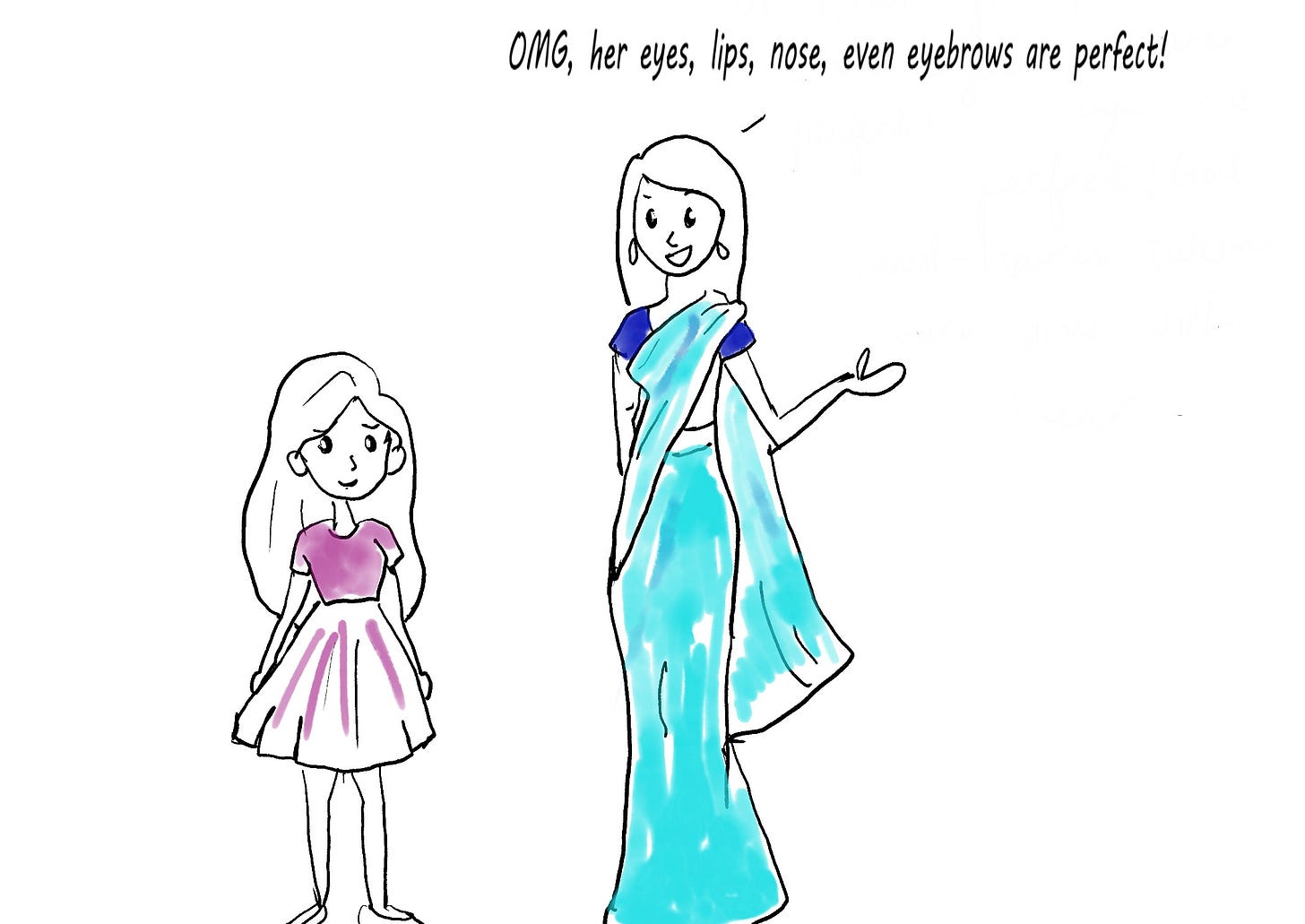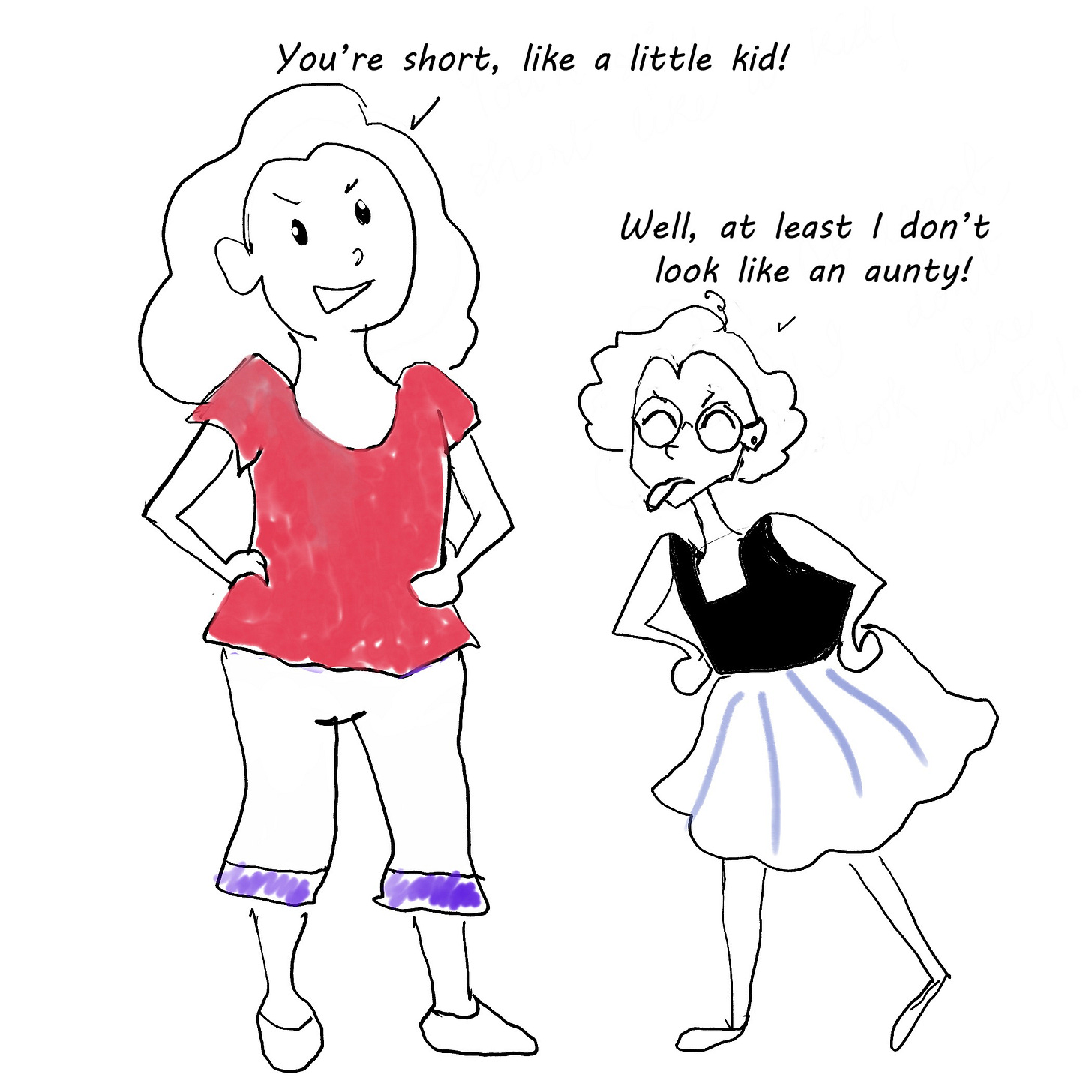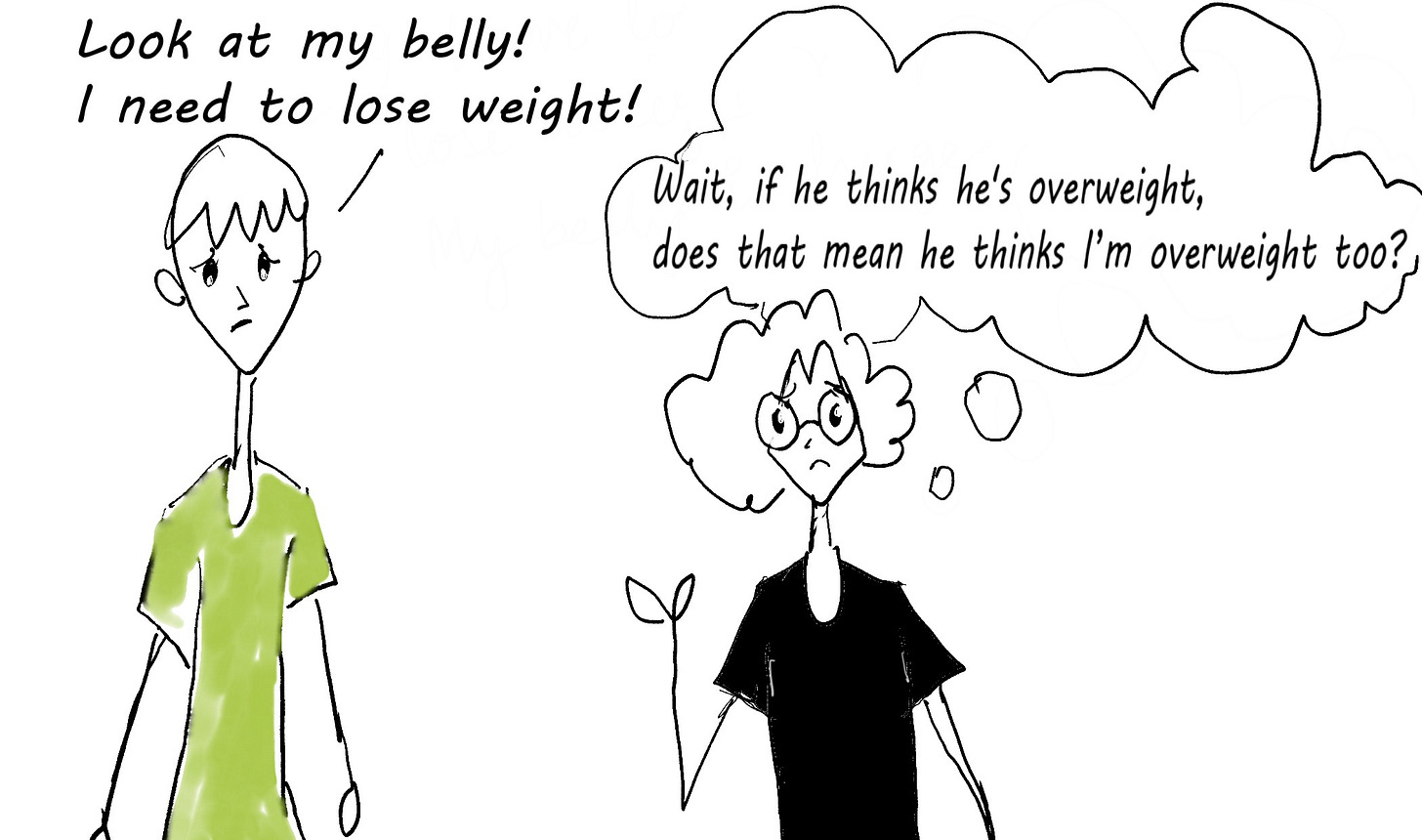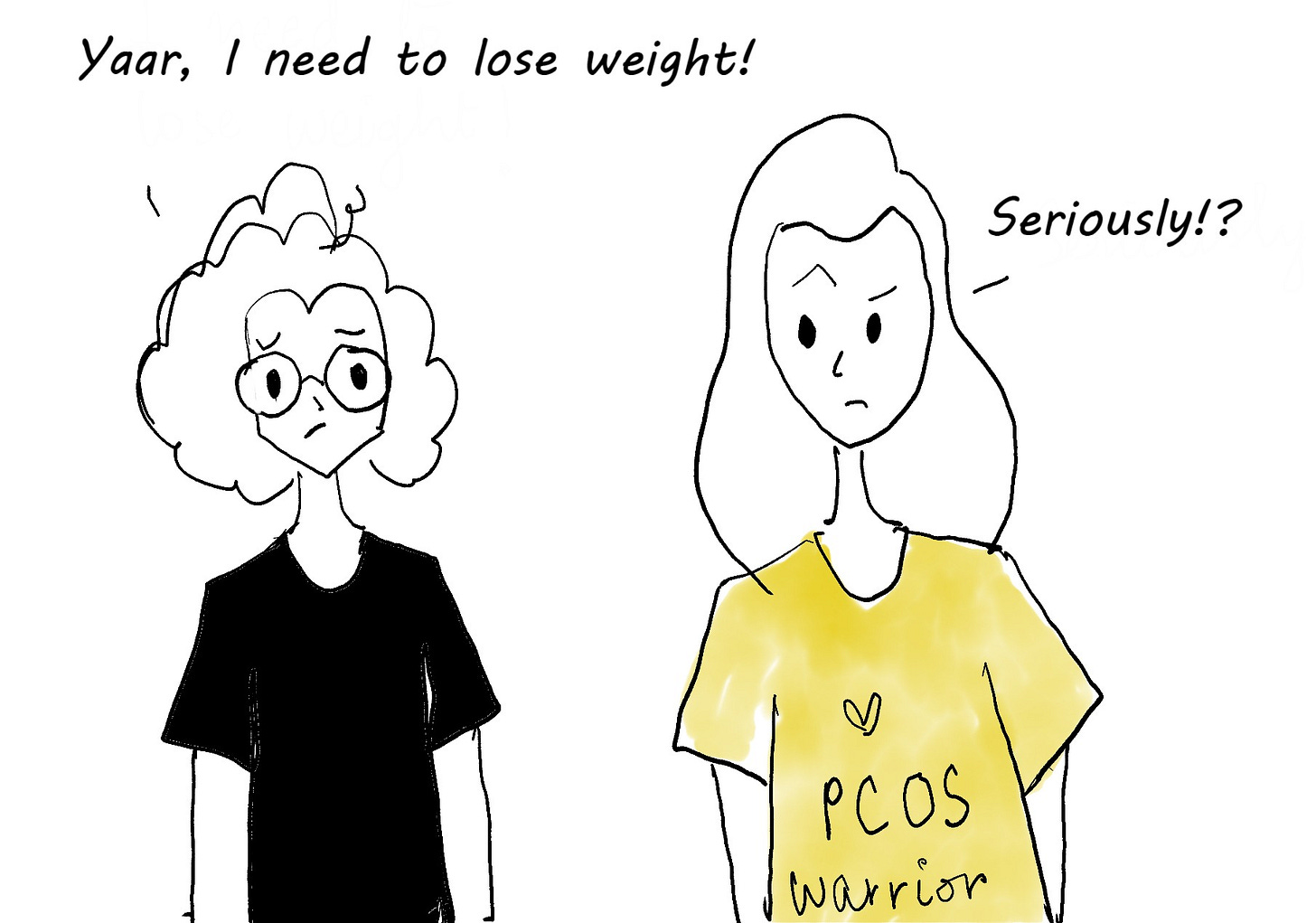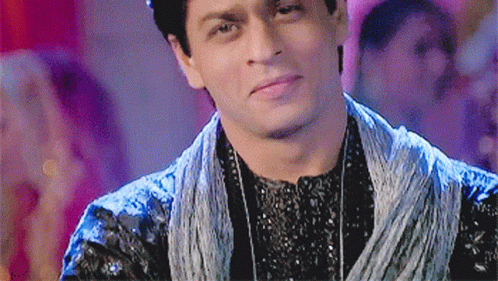Flawsome: Embracing My Body’s Imperfections
Issue #3.5: The journey of embracing a flawsome body—flaws and all, yet awesome
In my last blog, I explored body shaming and how it distorts our sense of self. I shared personal stories of how it affects us, like when a prospective groom’s family judges you based on impossible beauty standards. I still struggle to stay calm when people, even with good intentions, point out something about my appearance that I can’t change.
People would walk upto me and share feedback on my appearance as though none of their words was going to affect me. I may appear to be confident and may not appear to be someone who is vulnerable to body image issues, but hey, I’m not some magical being who can just snap her fingers and shake off every comment about her body. I’ve had my share of struggles, but mostly I have managed to move past my Body Image Dissociation (BID). Here's my story of how I did it.
Childhood
I have this memory from when I was a kid—everyone constantly told me how beautiful my sister was.
I wasn’t jealous—I adored her. But I always wondered why no one said those things about me. Years later, when we finally talked about it, my sister told me she felt the same way about my achievements. People praised my grades and art but only commented on her looks.
Then came the relatives with their unsolicited 'advice' on how I could look better. I mean, c’mon, we’ve all faced it! One even suggested my parents get me braces because my teeth were ‘like a bunny.’
I had to fight for my life begging my parents not to! I mean, I’ve read books—kids with braces always get bullied! I wasn’t ready for that!
But after that, I stopped smiling with my teeth in pictures.
Then there were cousins and school friends.
But school friends teasing me was harder. That’s when it hit me—maybe there was something really wrong with me? Not just in terms of beauty, but in a way that people aren’t supposed to be.
It didn’t help that my mom was insecure about her own height and often projected that onto me, constantly reminding me, "Skip—you have to be tall. Swim—you have to be tall. Drink this—you have to be tall!"
My dad, on the other hand, would reassure both of us, saying, "You’re adorable, no matter your height."
Still, I internalized those body standards. I thought I wasn’t bothered by it, but accepting those standards also meant accepting they were valid. I started clapping back at the teasing, but now, looking back, I realize I didn’t handle it well.
I get that I was just a kid, and it felt fair to hit back. But I never forgot the look on her face—it wasn’t right. Books have taught me better. Art has taught me better. Beauty is subjective—it’s in the eye of the beholder.
Teen years
As I grew older, my childhood insecurities only deepened. I didn’t believe I was pretty, and soon I also started worrying about my weight.
I stopped taking pictures of myself and avoided sleeveless clothes because I thought my arms looked too thick. Even the thought of going to the salon for a haircut would almost trigger a panic attack. Eventually, it became impossible for me to accept any compliment about my appearance. Whenever someone said I looked pretty, I’d just smile awkwardly, wondering if they were just trying to be polite.
What’s strange is that I always found everyone else beautiful, no matter how they measured up to societal standards. But my constant negative self-talk about being "fat" started affecting the people I loved.
The turning point came when I noticed a friend obsessing over his non-existent belly, going on about how he had a 'pooch.' His girlfriend, hearing him, immediately checked her own stomach and said, 'I guess I’m gaining weight too.’
That’s when I realized—my self-criticism wasn’t just hurting me; it was influencing the people around me.
So, how did things change?
Time and some great friends
I distinctly remember a trip with my best friend when I casually mentioned, "Ugh, my dress is pretty—that’s all that matters."
Her: Yes, you look pretty.
Me: It's because the dress is pretty.
Her: No, YOU are pretty.
Me: Haha, sure.
Her: I know you don't believe it, and nothing I say will change your mind, but I’ve always thought you’re beautiful.
This got me thinking. I’ve always seen beauty in everyone else, so why not in myself? Maybe, just maybe, I was pretty in my own quirky, unconventional way too.
And this wasn’t a one-off moment of insight. Over the years, I’ve realized that my female friendships have been the ultimate lifesaver. These women will hype you up and make sure you KNOW you're beautiful, inside and out. They’ll hype you up about your new haircut or save you from a fashion crisis when you’re staring at your closet like it’s a black hole—they’re always there for it all.
But the best part? Having the space to open up and laugh about these struggles together. What else can you expect from a squad who’s been through the same nonsense? We’d literally sit and curse anyone who had the nerve to body-shame one of us.
“Oh, he said the color didn’t suit you? Please! That guy needs his eyes checked—you were the prettiest that day!”
One time, I was walking with a friend in Pondicherry, and she was rocking a spaghetti top at the beach.
Out of nowhere, this random aunty popped up and said, “Ah ma, you’re so healthy. Why wear something like this?” (And by 'healthy,' we all know she meant 'obese.' Thanks, aunty.)
But my friend was sassy and clapped back, “It’s hot, and I’m comfortable—that’s all that matters, aunty.” Mic drop.
Watching her wear whatever she loved, without a care in the world about what people thought, made me feel so empowered. It was time to dig out all my old sleeveless tops that I’d stuffed at the back of my wardrobe!
This wasn’t a one-time revelation, either. Many of my friends and I have accepted each other for who we are—no daily compliments required, but when they come, you know they’re genuine and straight from the heart.
Influencers
My perspective shifted dramatically when I began following influencers who embraced their bodies unapologetically. These individuals didn’t shy away from their so-called “flaws”—they owned them. This was a stark contrast to the media I consumed growing up, where characters who were different were often ridiculed or used as the punchline, and actresses seemed to all sport the same idealized body type, complete with flawless skin and hair.
Then there’s David Suh, who helps people pose for photos while reminding them that the only problem with a bad picture is poor camera technique, not how you look. He shows people that they're beautiful just as they are. His content helped me become more confident in front of the camera and love what I saw in the pictures. From teaching people ‘poga’ (posing yoga) to helping them feel empowered in front of the camera, he turns posing into an act of self-celebration. Just look at this reel where he teaches how to pose in a saree if you're conscious about your arms or belly. The best part? When he talks about how, if you're not ready to celebrate certain parts of yourself, it’s okay not to reveal them.
Check out David Suh for posing tips and tricks—you might be surprised at how much they can change the way you see yourself in photos!
Therapy
Even though books and media helped me come to terms with my so-called "flaws," I still found myself skipping meals whenever I thought I needed to lose weight. I’d look in the mirror and dislike what I saw, even when my BMI was practically begging me to eat. That’s when I decided to try therapy, and oh mama, what a game-changer!
My therapist told me to skip affirmations I didn’t believe in. Think about it—I spent most of my life thinking I was ugly. You can’t just flip a switch and suddenly believe “I’m pretty,” right? My brain wasn’t buying it. Instead, I started with more neutral affirmations like, “I look normal.” And on some days, I even looked better than normal—maybe even pretty.
She also encouraged me to focus on specific things I liked when I looked in the mirror: some days it was my eyes, other days it was my perfectly curly hair. To help me remember those good days, she suggested I use sticky notes on my mirror or keep a journal of these seemingly small moments. It was like retraining my brain to let go of the old, unrealistic beauty standards and accept myself as I am.
It took time—months, really—but now I know I’m pretty cute, flaws and all. More importantly, I realized that feeling pretty shouldn’t always depend on someone else’s validation. I mean, aren’t we our own best judges?
The best advice my therapist gave me? "You’re so kind to others, so why are you so rude to your own body?"
Through these conversations, I learned that I’m so much more than just my appearance. If I can rave about how beautifully someone sketches or how hilarious they are, why not apply that same kindness to myself?
Special mention: Children’s Honesty
They say kids are the most brutally honest people on earth, and during my two years of teaching at a government school, I saw this firsthand. On my weirdest fashion days, when I felt completely off, a kid would still say something like, "What did you do today? You look so pretty!"
Or another might randomly add, "You have a beautiful smile, teacher."
It made me think, maybe I am pretty some days, even if only kids—who are pure and genuine—can see it. That unexpected honesty made me more comfortable in my own skin.
‘You are enough just as you are’ - Meghan Markle
I’ve learned that kindness—whether from a friend, a child or even yourself—can make a huge difference. I've surely made significant progress with my body image, but there are still days when I don’t feel particularly pretty. Sometimes, I simply feel “normal,” and that’s perfectly fine. On those days, I can either put in a little extra effort to style myself or just embrace a laid-back vibe. What matters most is that I’ve learned not to internalize harmful beauty standards.
It’s time we extend this kindness not just to ourselves but also to those around us who are affected by our words and attitudes. So here’s your reminder: Look at yourself how Shahrukh looks at his girls!






